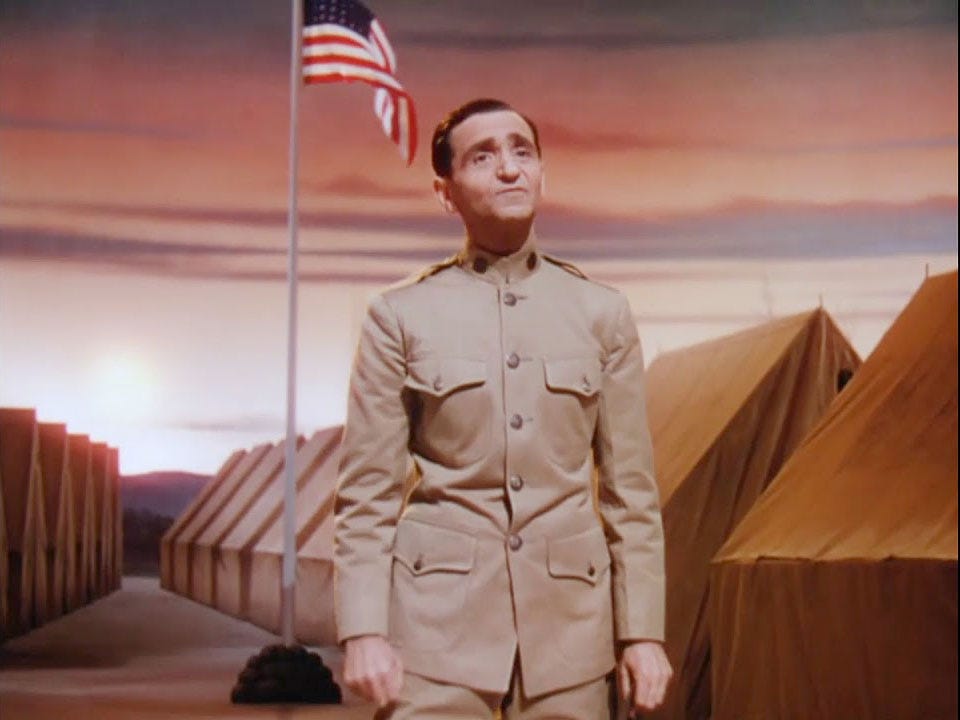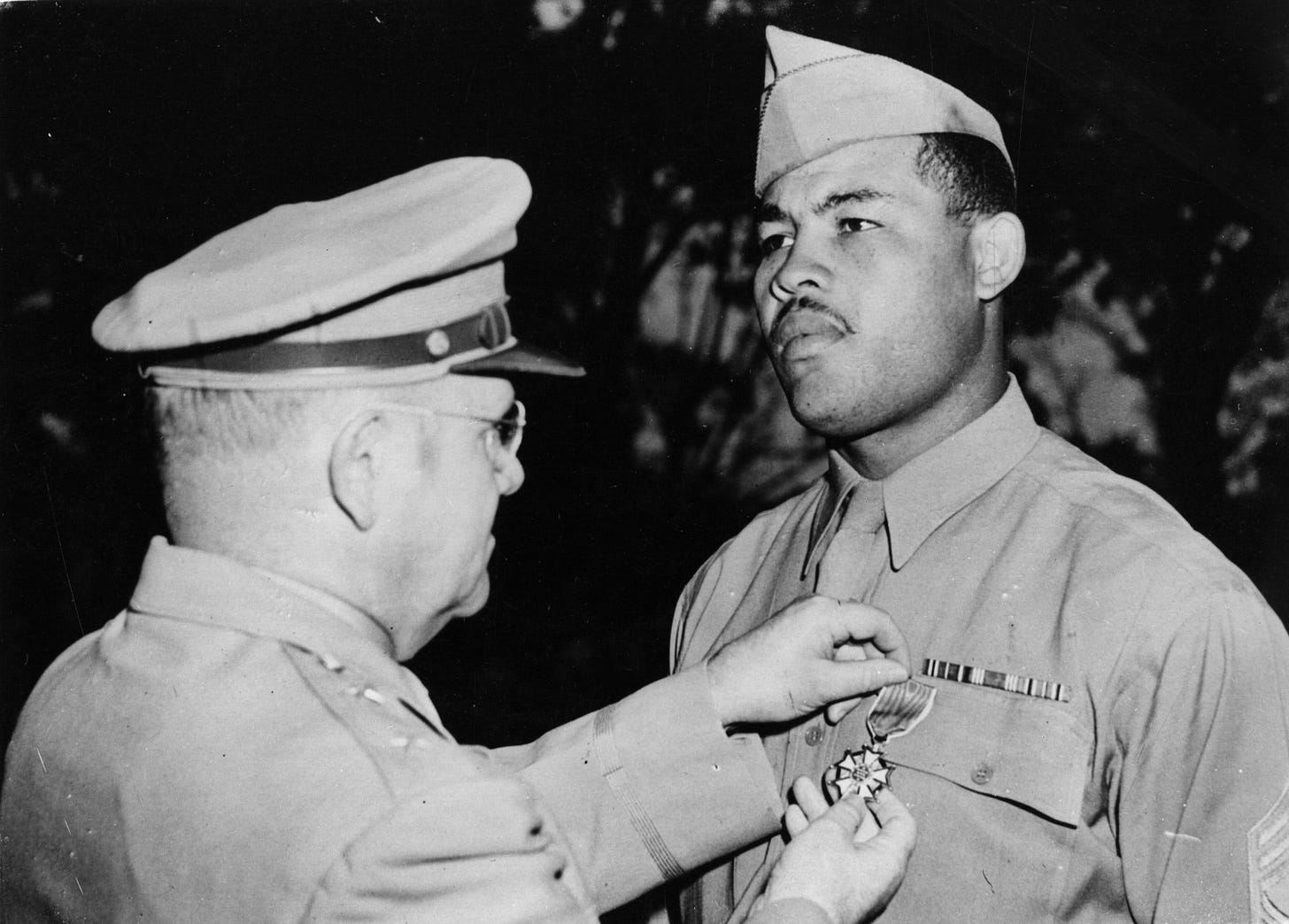GROSS/34 1943 - in wartime a movie is a weapon
They sing "this time we will all make certain that this time is the last time"
Gross is every year’s top-grossing movie, since 1913, reviewed.
THIS IS THE ARMY, MICHAEL CURTIZ, WARNER BROTHERS, 1943, 113 MINUTES. GEORGE MURPHY, JOAN LESLIE, RONALD REAGAN
This is the Army is a piece of work. A military machine engineered like a Sherman tank. It’s a theatrical revue of the old kind, a huge patriotic gala - with a cast, even in its earlier, Broadway form, of over 300 serving soldiers. The movie is a showcase for the songs and the stars of the day and a benefit that raised enormous sums for an army charity.
It’s also a smart self-referential narrative and there’s a lot to love in the performances of the ordinary soldiers in the revue. Every category of entertainer - acrobats, magicians, impressionists, comics, dancers and many, many singers - is present. These performances, many of which are Broadway slick and some amateur-hour cute, are affecting because we know that most of the men went on to serve and some didn’t come home (a proud audience member says “that’s my son, fourth from the left… he had to join the army to get into show business”).
Right at the centre of This is the Army is Irving Berlin, not a filmmaker but a songwriter - practically the first entry in the Great American Songbook, in fact. Also one of the small handful of songwriters who wrote the words and the music (Cole Porter is the other one you’ll have heard of). Berlin was born Israel Beilin, deep in the old Russian empire in 1888, and he came to America when he was still a small child, in 1893. By the time of the first world war he was already a successful composer. By the second he was a millionaire businessman too. The filmmaker was Michael Curtiz, a versatile and experienced director who could basically do anything (read my post about his The Adventures of Robin Hood) but here it’s clear that Berlin is in charge. Curtiz really just had to set the camera up.
Irving Berlin’s immigrant progress was that of a passionate convert to the American way. By the time he was 25 he was an American archetype. By the time he was 50 he was the ultimate American. He gave all the proceeds, in perpetuity, from his enormous hit - and alternative national anthem - God Bless America, to the Boy Scouts of America (that’s Kate Smith, ‘the first lady of radio’, singing it in the clip above - it became her signature tune) and, during both world wars, he toured America and the world putting on patriotic shows like This is The Army - never taking a cent in payment. He became a national hero but in the years before the USA joined the second world war the influential antisemites of the period used his devotion to his country as a weapon against him. What business did this Jew from a Byelorussian shtetl have in writing hymns to the greatest nation on earth? He overcame the hatred by means of his pure and uncomplicated devotion to his adopted country. Irving Berlin was American by force of will.
When at war
A state, when it goes to war, deforms everything, turns the culture upside-down. Irving Berlin seems to have understood this instinctively. He adjusted to war (twice) by dropping everything and conforming his work, his business and his imagination to the requirements of the wartime state. As a result, even to this day, he’s more closely identified with the idea of America and America at war than almost anyone else.
He surrendered his copyright in all of his patriotic works because he knew an individual - a citizen - could not respectably claim ownership in this kind of artefact. This kind of work naturally attaches to the nation, to the idea of the nation. In this it’s one of those awkward challenges to the American belief system that makes the individualists and market absolutists uncomfortable. In war, America becomes a collectivity, a national unity, of one purpose - welded, even across barriers of race and class, into a fighting unit.
But the film’s racial politics is as backward as you’d expect for a Hollywood production of this period. Black soldiers were still serving in segregated batallions throughout the military and their progress up the ranks was limited by harsh Jim Crow regulations (Eisenhower lifted the military colour bar in 1948). In one scene a group of black troops is signed up for the show and shipped off to rehearse. We see them later, performing Berlin’s ‘That's What the Well Dressed Man in Harlem Will Wear’, a number that makes an appeal to black men to swap their natty street clothes for a natty military uniform (it was a hit on 78 when released by Fats Waller).
Throwback
But before that we see a minstrel show - a huge song-and-dance number in which dozens of white soldiers perform Berlin’s Mandy, in blackface, on a staircase that spans the stage. It’s hard to stomach - not least because this is decades after the last regular minstrel show closed. It’s a throwback already, in 1943, and a signal of some kind about imperiled white traditions (the minstrel shows were already outdated when The Jazz Singer came out in 1927). The show’s producer yells, as the bizarrely blacked-up performers come off stage: “…and you kids were worrying about a minstrel number being too old-fashioned. Why it went just as well tonight as it did in the old show!”
This will sound silly - I try to be objective - but parts of this film are also hard to watch because they’ve got Ronald Reagan in them (he plays an army corporal and a producer of the show-within-a-show). Not because of what he became - Governor of California and then President and grinning avatar for neoliberalism - by then he’d been essentially neutered, reduced to an amiable instrument of the money men - but because of what we know about the man he was back then, in the forties, when he was still an actor. Reagan used his elite contacts to dodge combat all together - serving for a total of five weeks on a base in San Francisco and then for the rest of the war with the First Motion Picture Unit in Culver City, Los Angeles with his Hollywood pals.
And this is the guy who, immediately after the war, flipped and began informing on those pals, keeping lists for the FBI and reading them out at the HUACC. In this period he continued to get work, though, I imagine, in roughly the way a minor mafioso does - “put me in your picture or you’re going on the list.” In This is the Army, made a little before the informant years, in the Culver City period, Reagan’s a hopeless block of wood, such an unlikely heartthrob that we suspect his long-suffering girlfriend, played by Joan Leslie, is being blackmailed or drugged or something.
The Brown Bomber
And then there’s Joe Louis, ‘the Brown Bomber’, a heavyweight slugger of the highest order. A techically brilliant boxer who defended his championship more often than any other heavyweight in history. A man who was ultimately humbled not in the ring but by the web of scumbags circling it - the managers and promoters and, without a doubt, the US government, which persecuted him for decades - but that was yet to come when Louis signed on for This is the Army.
The period in his career between 1939 and 1941 became known as the the bum-of-the-month club because Louis was dispatching pretenders to his belt at such a rate - thirteen in all, one every two months, most of them inside the distance. He’d been a classy fighter since his amateur days and he’d been an idol in black communities for years because he kept knocking out disdainful white men, but as a black athlete and a businessman he met with the kind of derogatory media coverage and outright racism that you’d expect, thirty years before the civil rights breakthroughs.
Louis won over white America, though, and his support for the war effort was critical in this - he famously said of America’s entry to the war that it was “…cause we're on God's side.” He rehearses the line in the movie. When questioned about joining the still-segregated military himself he said “Lots of things wrong with America, but Hitler ain't going to fix them.”
In This is the Army Louis hits the speed bag at stage-left while black artists sing and tap and lindy-hop around him - even in the show the military is segregated, presumably a requirement of the top brass. Later we catch a glimpse of him marching in parade, rifle at his shoulder. When he died, in 1981, it was President Reagan who varied the rules so that he could be buried in Arlington National Cemetery with military honours.
Soldiers and workers
I’ve watched a lot of American movies here - and a lot of them are complicated class narratives - Frank Capra’s It Happened One Night, King Vidor’s The Big Parade. Some are uncomplicated hymns to capital - King Kong - or to a lost world - Griffith’s The Birth of a Nation, De Mille’s Something to Think About. This may just be sentimentality, but I think that what’s smart and lovable about This is the Army is that while we’re asked to admire various movers-and-shakers and out-of-touch generals (and sodding Ronald Reagan), the real heroes are the hundreds of ordinary serving men who fill every scene, and the Jewish immigrant who wrote all the songs and a generous sporting hero born in a shack in Chambers County, Alabama.
I watched This is The Army on Amazon Prime Video but there’s a pretty good free version on YouTube. A restored version with the original overture apparently exists but I can’t find it. No Blu-Ray, either.
The story of Joe Louis’s generosity is inspiring and heart-breaking. He funded young black sportsmen, paid for GIs to come to his fights and shows, and signed over huge sums to army charities - but he was ripped-off by his management and then punished for it by the US government. The IRS chased him continually and didn’t relent until he was an old man. For most of his later life he relied on friends to support him - including Max Schmelling, the German heavyweight he beat in 1938.
One of the big numbers in the revue is ‘I Left My Heart at the Stage Door Canteen’. The song comes at the end of a drag number set in a version of a real entertainment venue - The Stage Door Canteen was a small wartime hangout for American and allied servicemen, at 216 West 44th Street in Manhattan, close to Broadway. This number makes a sly reference to the huge effort to suppress the epidemic of venereal diseases that was a constant theme of wartime communications in the services. The ‘girls’ who work at the Canteen sing: “The rules and regulations are we mustn’t be seen outside the canteen with a soldier. They each could do with a gal, would greatly help their morale, but we simply must resist. We take an oath when we enlist, to never be found, canoodling around with a soldier.”
The House that George Built is a superb book about songwriters of the Great American Songbook, centred on Gershwin, but with plenty about Irving Berlin and his contemporaries.
Here's a list of all the top-grossing films since 1913 and here's my Letterboxd list and here’s another top-grossing list.







